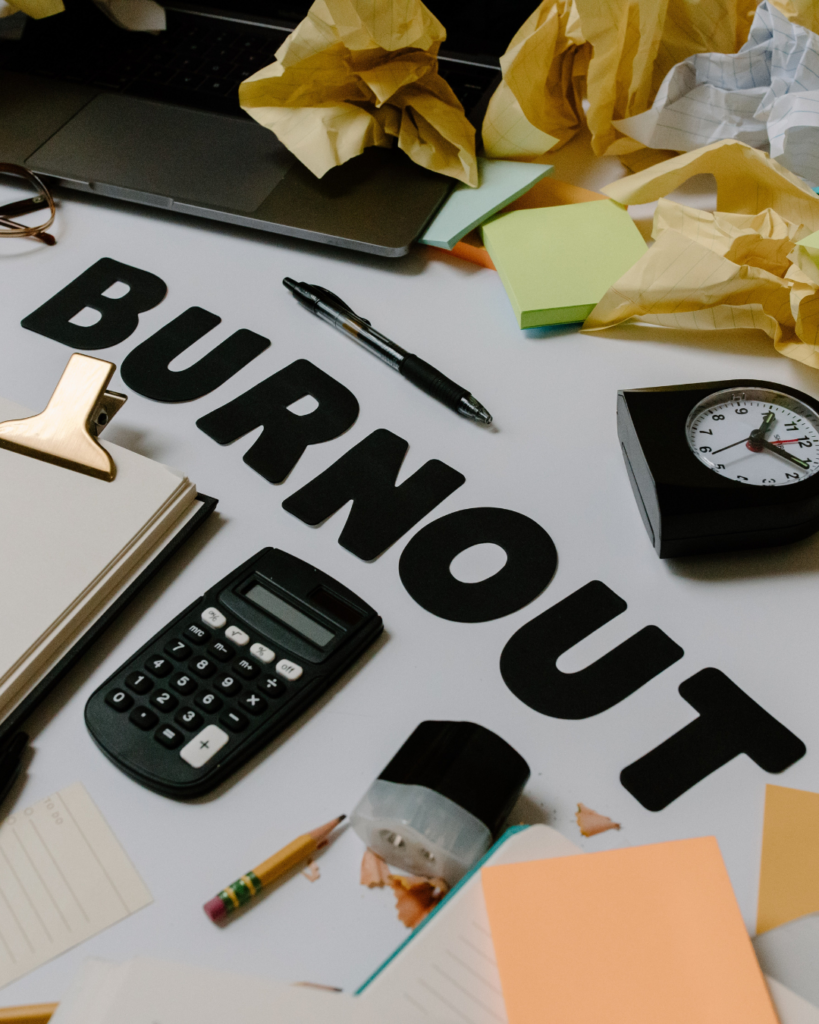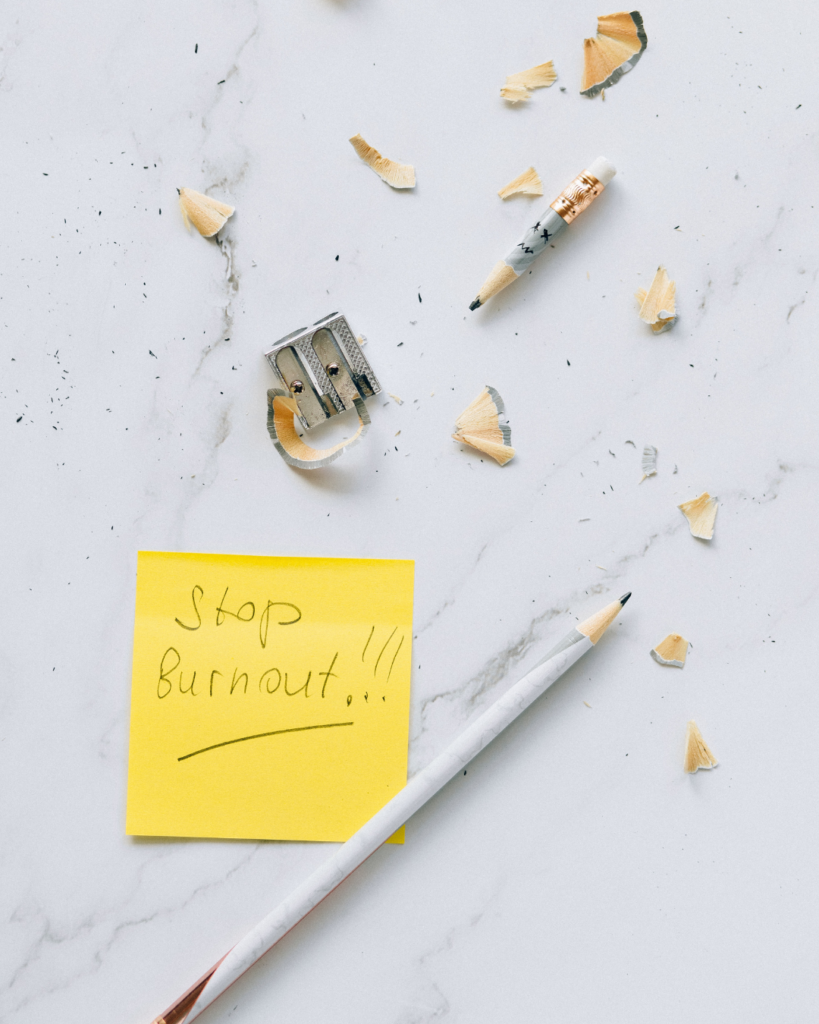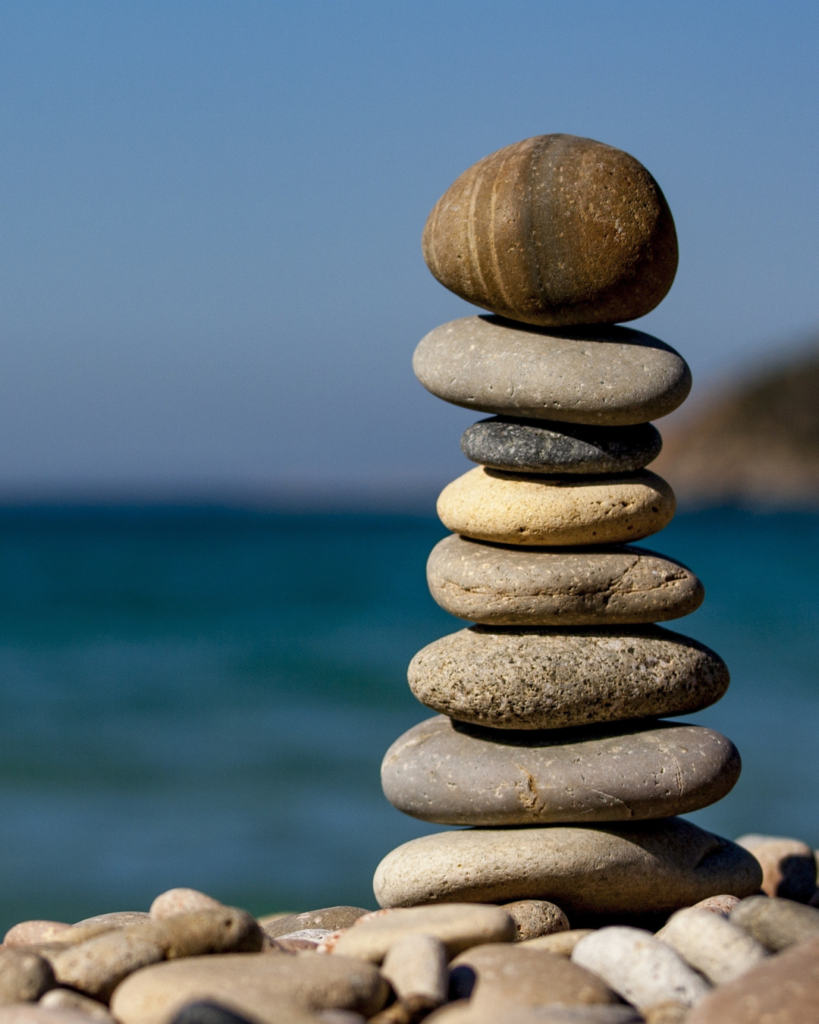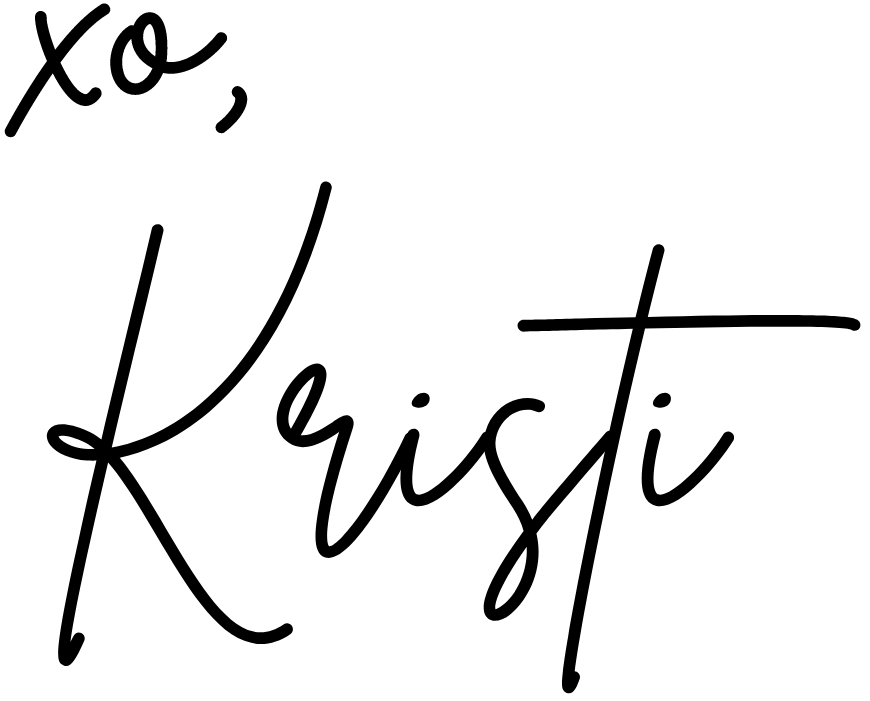How to Avoid Burnout While Striving for a Life Well-Lived

Here’s a pattern you might recognize. You have a big dream that you’ve decided to pursue. You’re pouring your heart, your soul, and every waking hour into making it a reality. And then, suddenly, you find yourself struggling to scrape together even an ounce of energy or motivation to take the next step, and you start to wonder if you made a big mistake trying to go after this goal, or if you’re just being lazy. Before you give up on your vision, let’s talk about what’s really going on and how to avoid burnout while you’re striving to make big things happen in your life.
And, just to reassure you, what you’re experiencing is totally NORMAL! Most people who have decided to strike out in a new direction and make a big life change have had these same thoughts and feelings along the way.
As a post-doc psychosocial researcher, and having more that a decade of experience working with folks to make personal and professional life changes, I can tell you that this is a very common part of the process of transformation.
Knowing that, we intentionally implemented strategies to support ourselves through it when we decided to go from homestead to farmstead. We know we’re not immune to this experience either, and we didn’t want it to undermine our efforts while building and growing our farm.
In this week’s episode, we shared about one of the ways we work to avoid burnout and why we believe it really matters to new farmers.

Click here to subscribe to our channel, and never miss an episode!

Disclosure: This is not a sponsored post, and I have received no compensation for sharing anything that follows. Some links within this blog may be affiliate links, and I might earn a commission if you make a purchase through that link. This usually amounts to cents, not dollars, and helps to support the projects featured on this blog. I only recommend products from companies that I have found to be trustworthy. Read my full disclosure here.


No, You Aren’t Lazy.
People who are highly motivated go-getters with big dreams and aspirations are often the first people to criticize themselves for being “lazy”.
It seems counter-intuitive, though. Why would someone with so much potential, competence, and enthusiasm question their own abilities and motivation?
Simply put, folks who are used to going 100 MPH have conditioned themselves to function at a “race pace”.
Think of it like this. When you’re training for a marathon, you need to be able to run at different speeds. Each training session should include a warm-up and cool down, for obvious reasons. Then, you need to become proficient at steady-state, tempo, threshold, and race-pace intervals so that your body can be prepared for different points in the journey. And in between workouts, the biggest gains are achieved through periods of rest.
High-performers, however, often operate at one speed–the race pace. They’re sprinting through life all the time, and so when they go from functioning at 100 MPH to 80 MPH, it doesn’t matter that they’re still going faster than everyone else. To them, it feels slow.
Is that the same thing as lazy? Of course not!
But it’s also the fast-track to burning out your nervous system because the body and mind are simply not designed to work that way.

What Burnout Is, and What It Isn’t
Okay, now we’re on the same page and agree that burnout is not laziness. The other thing burnout is NOT is depression.
However, there is a lot of overlap between burnout and depression. A big difference, though, is that burnout happens in response to an experience. Depression, on the other hand, doesn’t need a stimulus to occur.
It can often be really difficult to tell the difference while you’re in the midst of struggle. It’s tough to be objective about yourself at any time, but especially so when you aren’t functioning as well as you’d like.
The very best thing you can do is to reach out to a trusted professional (your doctor, therapist, etc) and have the courage to have a candid conversation about what’s going on. This does not mean Googling and self-diagnosing, and it does not mean taking advice from strangers on the internet. Work with someone who is both an expert in their field and who is as invested, professionally, in your well-being as you are, personally.
The Signs and Symptoms of Burnout

Recognizing Burnout Early
Recognizing the signs and symptoms of burnout early creates an opportunity to intervene before you begin to suffer more serious consequences to your well-being. How burnout shows up in your life will be a little different for everyone, but what follows are some red flags and warning signs.
If you recognize these patterns in your own life, consider them red flags, and please reach out to your doctor. Remember–burnout is not laziness. This isn’t a character flaw; it’s a form of severe exhaustion, and it can be corrected.
1. Physical Symptoms
- Chronic Fatigue: An overwhelming feeling of tiredness and lack of energy, despite adequate rest and sleep.
- Insomnia or Irregular Sleep Patterns: Difficulty falling asleep or staying asleep due to an overactive mind and excessive worry.
- Frequent Illnesses: A weakened immune system, making you more susceptible to infections, colds, or other illnesses.
- Muscle Tension and Pain: Persistent headaches, backaches, or muscle tension, often linked to chronic stress and anxiety.
2. Emotional and Behavioral Signs
- Depersonalization and Detachment: Developing a cynical or negative attitude toward work or activities that were once enjoyable, distancing yourself emotionally from tasks and people.
- Decreased Satisfaction and Accomplishment: A sense of inefficiency and lack of achievement, despite working hard and investing substantial effort.
- Isolation and Withdrawal: Withdrawing from social interactions, avoiding colleagues, friends, or family, and seeking solace in solitude.
- Increased Irritability and Impatience: Becoming easily frustrated, short-tempered, or irritable, even in minor or routine situations.
3. Cognitive Indicators
- Impaired Concentration and Attention: Difficulty focusing on tasks, maintaining attention, or staying engaged in activities that demand mental effort.
- Memory Problems: Forgetfulness and difficulty recalling details, often attributed to chronic stress and overwhelming workloads.
- Negative Self-Perception and Reduced Self-Esteem: Experiencing a diminished sense of self-worth, doubting your abilities and accomplishments.

Understanding the Causes of Burnout: The Roots of Chronic Stress
Obviously, everyone experiences stress. Some periods of life have more of it, and there are times where we feel like we have a good handle on it. But no one is immune.
Generally speaking, wellness practitioners define two main areas of stress: work-related or personal.
However, I have always been famous (or infamous! ha!) for helping my clients see that these two things aren’t mutually exclusive. Our society perpetuates a myth of “work-life balance” to which I do not subscribe.
For most of us, how we spend the majority of our waking hours is part of our identity. One of the first questions you ask someone when you meet them is “What do you do?”. Inevitably they respond with something like, “I’m a nurse/teacher/farmer/etc”.
No one ever says “I work as a farmer”. They say “I AM a farmer”. My research over the past 10+ years has taught me that our work is an essential part of our identity, and therefore, it’s all personal.
But, for the sake of breaking this down, here are the most common causes of burnout in both areas of life.

Work-Related Factors That Contribute to Chronic Stress
I think it’s important to mention here that “work” means a lot of different things. I prefer to think of work as what we do with our time in alignment with a purpose, rather than simply a job that results in a paycheck.
So whether you go to an office, get on a tractor, raise children, or run marathons, everyone expends effort doing something with their day, and whatever that is for you counts as work. It doesn’t matter whether someone pays you, you’re an entrepreneur, or you volunteer–however you spend your time making a contribution in this world is your work.
1. Excessive workload and unrealistic expectations
Just like we talked about earlier regarding functioning at a “race pace” all the time, trying to do too much at once has the potential to result in burnout. There are certainly going to be times in life where you need to sprint and hustle to keep up with competing demands for your time, but if you are chronically in a state of overload, it becomes unsustainable and unhealthy.
When you set unattainable standards for yourself (or if your boss sets these expectations for you), you place immense pressure on your shoulders to meet these expectations consistently. This pressure can lead to chronic stress as you feel perpetually driven to excel.
When you’re constantly worried about not meeting these expectations, the fear of falling short of your own standards can be paralyzing and result in anxiety. To meet unrealistic expectations, people may feel compelled to work longer hours, oftentimes even neglecting their personal lives, physical needs (like nutrition, hydration, exercise, and sleep), and emotional well-being.

2. Lack of control and autonomy
During research studies I’ve conducted on individuals’ experiences with meaningful work, a common theme always emerged around the need for a sense of autonomy and agency. These two ideas are different, but related.
Sense of Agency
A sense of agency is about your belief in your ability to do something. In my research, however, the data revealed something interesting. People want to acquire their own knowledge through trying (and failing) rather than being instructed about how to do something.
This means that people want to figure things out for themselves in order to cultivate a belief in their abilities. They don’t develop a true sense of agency if they are simply taught how to do something. It’s the hands-on doing of the thing that’s so important.
There is real value in being able to use your critical thinking and problem solving skills, and if you aren’t given the opportunity to do so, you might feel a little bit like a robot in your work-life. This emptiness can lead to chronic stress as you struggle to feel fulfilled in your daily work.
Autonomy
While a sense of agency is about having a belief in your abilities to act, autonomy is the extent to which you are free to act.
If you’ve ever been in a position where you know how to do something, but you are powerless (or limited) to use your knowledge and skills, you know how stressful that situation can be. People want to feel useful, and it’s in our nature to want to make the world better. So if you’re denied the opportunity to use your gifts, it creates a lot of frustration and inner turmoil.
If that’s a persistent scenario for you in your work-life, it can certainly lead to chronic stress and, ultimately, burnout. This often appears in toxic organizational cultures or places where bureaucracy runs rampant. If you often feel that you are powerless or that your hands are tied, stress is pretty much inevitable.

3. Inadequate resources and support
Trying to work without the right tools or resources is stressful, and most people have experienced this at some point. Whether you’re dealing with a situation where you’re short-staffed, lack an appropriate budget, or haven’t been properly trained, these are all conditions where stress will thrive.
During the pandemic, this issue was especially highlighted for people in positions of public service. From teachers to nurses and countless others in between, we saw the extreme impacts that inadequate resources could have on peoples’ well-being.
Farmers (and entrepreneurs of all kinds) also know all about this, and if you’re new to the business, you might be feeling this on many fronts simultaneously while you’re attempting to wear many different hats.

Personal Factors That Contribute to Chronic Stress
These are certainly not the only personal factors that can contribute to stress, however, they are common causes when we think about chronic manifestations of stress.
There are many other variables in your personal life that can influence your well-being on a day-to-day basis, as well. When thinking about how to avoid burnout, I would encourage you to take stock of all the ways that stress plays a role in your life.
1. Perfectionism and high self-expectations
This is a point that I can speak to with a whole lot of personal experience. I am absolutely a recovering perfectionist, and I say it that way because it requires a consistent daily practice for me to not allow perfectionism to take over and suffocate me with the resulting stress.
Setting a high bar for yourself and striving for excellence isn’t a bad thing. But when that becomes a toxic obsession that results in self-criticism and cynicism, it can crush you and the dreams you have for your life.
Perfectionism comes from a deep place and really needs an entire blog post of its own, but the important thing to understand is that it can be a source of chronic stress and lead to burnout if not properly addressed.

2. Poor work-life harmony
I mentioned earlier that I don’t subscribe to the idea of work-life balance. I do, however, believe it’s important to cultivate harmony between our work and personal life.
Balance is a binary concept. It implies this or that, “either/or”. It is a zero sum game.
Harmony, on the other hand, is a “both-and” concept. It accounts for the ebb and flow of life between two shores.
For many of us, our work is our passion. It is absolutely fundamental to who we are, and therefore, inseparable from our personal life. But that doesn’t mean we don’t still need to make room for the other facets of our identity.
That’s where we can use harmony to support a life well-lived.
If you’re working to the exclusion of nurturing healthy relationships or taking care of your health and well-being, that’s just not going to be sustainable. One of the big ways we can make a difference when thinking about how to avoid burnout is by finding harmony between work and play, striving and rest, focus and relaxation, concentration and tranquility.
Our soul is filled by the harmony of all these things, not just one or the other.

3. Lack of self-care and tools for coping
Because burnout is an extreme form of exhaustion, a lack of self-care and tools for coping play a dangerous role.
When we neglect self-care practices, it makes us physically vulnerable to the impacts of prolonged stress. Additionally, without effective coping mechanisms like mindfulness, relaxation techniques, or seeking emotional support, stress accumulates unchecked.
The absence of these tools can ultimately result in our inability to manage stress, leading to emotional exhaustion, reduced resilience, and finally, burnout.
But even if we know these tools, we still have to find a way to put them into regular use to see any benefits. Knowing what to do is the easy part, but actually doing it takes work. Failure to prioritize these practices can contribute significantly to the development and persistence of chronic stress and eventual burnout.

Strategies to Prevent Burnout: Building Resilience and Sustaining Well-being
Now that we’ve covered what burnout is, how to recognize it, and the primary causes in both work and life, let’s talk specifically about how to avoid burnout.
Unfortunately, too many people come to this topic after burnout has already happened. If, instead, we focused on how to avoid burnout altogether, we could save ourselves a lot of suffering–not to mention lost time and progress toward our goals.
I’m all about being proactive versus reactive. It’s far more efficient to prevent a problem in the first place than to repair one after the fact. If you utilize the skills below, you’ll be a step ahead of the game in preventing burnout before it takes over.
However, maybe you’re already in the trenches, and it’s time to do the work to get back to a healthy place. First and foremost, please talk to your doctor or professional wellness provider, and don’t try to do this alone. Being resourceful and having grit is not about rejecting help. In fact, asking for assistance is part of the hard work that most people don’t have the courage to do. Don’t settle for mediocrity. Strive for excellence, and take the right first step by having an open conversation with a pro.

1. Setting Healthy Boundaries
People often think that boundary-setting is just about saying no to things. For that reason, many people think it’s too hard. They don’t want to be viewed as negative, or difficult, or confrontational.
What I would encourage you to consider is how setting boundaries is actually about saying yes to the life you’re trying to build.
Is it more important to you that you’re liked by others for being the version of yourself that they want you to be? Or, do you value the vision you have for your own life enough to protect it with healthy boundaries that get you where you want to go?

2. Creating Sustainable Routines for Self-Care
Eating properly, getting enough sleep, exercising, and nurturing a sense of connection are all essential to our well-being. Yet, these are often the first things that fall off the plate when we’re striving to reach a big goal.
But here’s the thing, you cannot sacrifice yourself in the process of becoming the person you want to be. The two things just cannot co-exist.
So long as you do not see yourself and the need to practice self-care as a priority, you will not be able to cultivate a life well-lived.

3. Mindfulness and Being Present
One of the most cumbersome challenges for folks when they’re pursuing big goals in life is that they struggle to remain in the present. This is all about being mindful.
You have to work very hard to focus only on the task at hand instead of becoming paralyzed by the enormity of the big picture. That big picture is made up of small incremental steps over time, but if you’re too overwhelmed to take those steps, you’ll never get closer to the reality you want.

4. Replenishing Your Physical and Emotional Energy
Here’s the truth: You cannot pour from an empty cup.
You can have all the enthusiasm, commitment, ambition, and good intentions in the world, but if there’s no gas in the tank, you’re not going to get anywhere.
It is so important that you find ways to refuel yourself regularly. How you do that is going to be unique to everyone because we all derive energy from different places.
It might be getting in touch with your spirituality, spending time in nature, reading a good book, cooking a favorite meal, putting on music and dancing with wild abandon, walking your dog, or an infinite number of other possibilities!
Figure out what recharges you, and make that a priority.

5. Re-Framing and Managing Your Perspective
When you’re doing something big in your life, it can be easy to lose sight of why you started in the first place. Reconnecting with your “why” is an important practice in how to avoid burnout, but do you know how to do it?
Our decision to start a farm was about something more than just starting a farm. What it represents to us is freedom, greater self-sufficiency, and a quality of life that aligns with our values.
If you haven’t figured out the driving force for your striving, a good exercise is to journal about your underlying motivations. This exercise is called “The 5 Whys”.
Take your big goal as the starting point. Let’s say it’s “build a house in the country”. Why is that important to you?
Maybe your answer is “because I want to get out of the city”. Okay–why is getting out of the city important?
Maybe your answer to that is “because I can’t stand the noise and crowds”. Great–so, what’s important about getting away from the noise and crowds?
You might say “because I want more tranquility and peace in my life”. Now we’re getting somewhere…so, why is tranquility and peace essential for how you want to live?
At this point, you might realize that “it’s because I want to live in an environment that allows me to focus and be able to hear my inner voice without so many distractions so that I can experience more creativity and inspiration”.
That is a totally different thing than just building a house in the country, but can you see how much more powerful it is? It is generally recommended to ask “why?” a minimum of five times during this exercise to really get to the heart of what matters to you.
Coming back to your WHY is a way to shift your perspective and put things into better focus.

Don’t Burn Out: The World Needs Your Light
We live in a culture that rewards overload and wears exhaustion as a status symbol. We count weariness as a sign of one’s good character and humility.
But tell me, how does it serve the world for you to destroy yourself in pursuit of a goal?
How can your unique gifts and talents be used to make a positive difference if you incapacitate yourself through burnout?
Do not devalue the miracle of your life. You are not here by accident, and the things you feel driven to do, be, and create are written on your heart to serve a purpose. You matter. And so too, then, does your well-being.
Understanding how to avoid burnout is just one piece of knowledge on the way to a life well-lived. Here on our little farm, as we strive to build the life we’re dreaming about, this is the real work. Tilling the soil and getting our hands dirty requires nowhere near the effort it takes to become the versions of ourselves we know we were meant to be. So we’ll keep having these conversations, and we hope you’ll join in and share your wisdom along the way, as well.
Be well, friends.

Ready to dig in and grow something beautiful?
Get my Free Garden journal
Let’s be gardening buddies! Sign up to join our community, and get your free printable PDF Garden Journal. This is so good!









